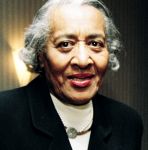Local Black women who have achieved much in their careers often cite Dorothy Height as one of their inspirations. All were saddened to hear of her death April 20 at 98.
“I was very sorry to hear that on the way to work,” said University of Pittsburgh Teachers Institute head Helen Faison.
 |
|
HELEN FAISON
|
“I hadn’t seen her for a few years, but when last I did she looked great. She was everywhere, always working to better the lives of Black women, from domestics to those serving in high positions. I couldn’t afford to join a sorority in college, but I was a member of the YWCA. I would speak to her occasionally, and when I did she always had something positive to say and contribute.”
Mary Smith Peters, board president for the YWCA of Greater Pittsburgh, said Height’s life does speak for the YWCA.
“She is one of the mothers of the women’s movement. She began working for the Y in 1937 and a lot of her civil rights work was done through the Y,” said Peters. “Her life and legacy are a very big part of our work, she helped develop our core purpose, eliminating racism and empowering women. Her work allowed us to be in boardrooms—I’m president of the board. We may have lost her physically, but her legacy is an integral part of where we are as an organization, and where we’d like to be as a nation.”
 |
|
MARY SMITH PETERS
|
Sonya Toler, executive director of the Governor’s Advisory Commission of African American Affairs, met Height on numerous occasions over the years and was always impressed.
“What I found adorable about her—she grew up in Rankin—was that she always tried to came back and participate in activities in the Pittsburgh area. I admired her for that,” said Toler. “A lesson I learned from her was to always try to establish understanding. She brought together women of all races to discuss their differences and their similarities, and through that she created strength. Just to be in her presence, to say, ‘thank you,’ was a reward. She fought for women’s rights, civil rights, but I think her real impact was in human rights—she wanted equal rights for everyone. That’s what it boils down to.”
Connie Portis, the past publisher of Renaissance Publications, remembers honoring her with the Black Trailblazer award at the Black Extravaganza in 1990.
“I was a member of her National Council of Negro Women when we did that, and when she came to receive it,” said Portis. “She was perhaps the most inspiring woman of several generations. She had boundless energy and conviction, and just got things done. I don’t know any other woman who commanded that kind of respect. She was elegant, soft spoken, but her voice resonated with her mission. Even a few weeks ago she was still working on issues. She was a priceless example of how to stay with it.”
Celeste Taylor, head of the Regional Equity Monitoring Project, said it was ironic that she should be preparing to speak at a Women and Girls Foundation Equal Pay Day rally when she heard of Height’s death.
“She was relentless, pure inspiration for me,” said Taylor. “I met her just once. She was amazing, very regal, but very approachable, like Rosa Parks. They remind me a lot of one and other. She gave me a practical way of looking at my own work. She was a role model.”
Allegheny County Real Estate Department Manager Valerie McDonald Roberts agreed about Height’s presence.
“I had met her a few times when she came for her sorority Delta Sigma Theta,” said Roberts. “She had a nobility about her, you really didn’t need to hear her talk. The history, the struggle—you just felt it. It was like being in presence of Nelson Mandela, whom I also met. Their lives speak for them.”
(Send comments to cmorrow@newpittsburghcourier.com.)